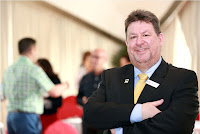 |
| Martin Hill, Senior Tutor BSC |
When we started the New Year everyone’s thoughts turned to setting resolutions. A boom time for diet clubs and gym memberships. The media coverage also saturates our every moment with articles about resolutions, often “guilting” people into setting resolutions – and inevitably these resolutions are so unrealistically ambitious that they are designed to inevitably fail.
“What’s all this got to do with coaching?” I hear you ask. Well let’s look at the definition of resolution. “The act of resolving or determining upon an action, course of action, method, procedure, etc.” (www.dictionary.com) That definition sums up for me what I am trying to achieve in a coaching intervention with my clients.
Coaching should be goal based and action-orientated. So what lessons can we learn from our resolutions experience and knowledge?
- Whose is it? Notice the influence of media or peer pressure? If the resolution or goal is not wholly owned and believed in by the individual – you’re doomed before you start. The resolution or goal must be desired by, believed in and owned by the individual- have you connected head, hand and heart?
- Realistic? Unless you’re called Tim Peake you’re goal to become an ambition is perhaps more Star Farce than Star Wars. But it took Tim Peake from 2008 until 2015 to achieve that ambition. If it is an ambitious, big, goal – bear in mind the proverb “How do you eat an elephant? One bite at a time”. Make the goal attainable by setting small steps and ensuring that there is always a future, forward facing, focus.
- Get back on the bike- even with the most committed, the road to embedding the new resolution is often not a straight A to B journey. Falls and setups are inevitable, to quote Nat King Cole:
For when my chin is on the ground.
I pick myself up,
Dust myself off
And start all over again.”
Your job as the coach is help the individual reflect, reassess and then re-motivate them.
Keeping with the theme of resolutions – you will undoubtedly be setting your personal resolutions – but what about your coaching resolutions? Need some food for thought?
- Review and refresh your Continuing Professional Development plan – does it address your needs AND your business needs?
- Widen your network – what plans do you have to increase your networking breadth? A gentle introduction could be the British School of Coaching’s Network - the next UK Network is May 2016 and the Middle East Network is February 2016
- Join a professional coaching body – remember all British School Of Coaching learners have affiliate membership of International Society of Qualified Coaches (ISQC) whilst they are studying. Look at the choices out there and select the one that suits your needs and your practice.
- Set a learning goal – what new skill do you want to learn or what do you want to improve?
- Continuous Improvement – how can you ensure that you extract every drop of learning from your own coaching interactions? What is your reflective learning practice? Why not embrace new technology and use your smart phone to make a voice recording to capture your thoughts, feelings and reflections immediately after the session – and then write up later, allowing for further reflection in the interim.
- Supervision – review and refresh your own supervision regime. Try a combination of approaches – individual or peer or group. An opportunity to sample a group supervision session is available at the British School of Coaching’s UK Network in May 2016.


